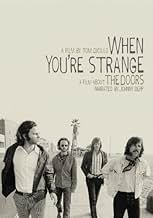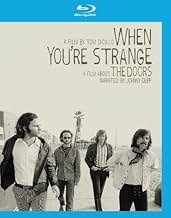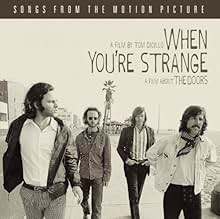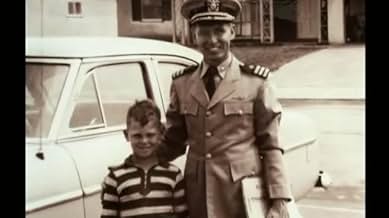A look at the late '60s and early '70s rock band The Doors, including rare exclusive footage.A look at the late '60s and early '70s rock band The Doors, including rare exclusive footage.A look at the late '60s and early '70s rock band The Doors, including rare exclusive footage.
- Awards
- 2 wins & 1 nomination total
Johnny Depp
- Narrator
- (voice)
John Densmore
- Self
- (archive footage)
Robby Krieger
- Self
- (archive footage)
Ray Manzarek
- Self
- (archive footage)
Jim Morrison
- Self
- (archive footage)
Pamela Courson
- Self
- (archive footage)
- (as Pam Courson)
The Doors
- Themselves
- (archive footage)
Murray Goodman
- Self - Judge
- (archive footage)
Jimi Hendrix
- Self
- (archive footage)
Lyndon B. Johnson
- Self
- (archive footage)
- (as Lyndon Johnson)
George S. Morrison
- Self - Jim's Father
- (as Admiral George S. Morrison)
Paul A. Rothchild
- Self
- (archive footage)
Adolf Hitler
- Self
- (archive footage)
- (uncredited)
Janis Joplin
- Self
- (archive footage)
- (uncredited)
John F. Kennedy
- Self
- (archive footage)
- (uncredited)
Robert F. Kennedy
- Self
- (archive footage)
- (uncredited)
- Director
- Writer
- All cast & crew
- Production, box office & more at IMDbPro
Featured reviews
"When You're Strange" is a music Documentary, which takes you through the short career of a world famous 1960's band, The Doors.
For this alone, the documentary is worth watching. That said, this is so interesting to watch, because it is a story with so many levels, mainly because it took place in a time, when things were changing.
It was the 1960s. A still growing group of people invented in the 50s, namely the young, could and would not be ignored any longer. As Morrison put it: 'we want the world, and we want it now' To them things were not black and white anymore. Men and women were not men and women, but human beings. The solution was definitely not war, but the absolute opposite. On the other hand the parents, and older generations, were stubbornly holding on to the old order and its values, and a larger and larger gap was growing between these two fronts.
The spotlight in this film is heavily focused on the Doors most famous member, Jim Morrison, and for a good reason. Jim Morrison became a clear symbol of the new, and the young, mainly because he wanted more out of life than the norms allowed, and simply went for it. On top of this, Jim had an interesting background, which is a prime example of the generation gap. Jim Morrisons father George Morrison was an admiral in the navy, and was involved in the Vietnam war. He was against Jim's involvement in rock music, wanted his hair cut, and to get an education. Jim ignored his parents to such an extend that he claimed his family dead, when asked by journalists.
If you know the story of The Doors and Jim Morrison already, this will be a stringent summary of the events with a well written and good narration by Johnny Depp. There is nothing new in the story itself and thankfully no conspiracy theories about Morrisons death. Where this documentary really shines and adds yet another level, is through the footage and the way this is put together. Some of this footage has never been shown before, and parts of it is still so crisp and clear that it's eerie. It is bound to send you on an emotional ride, if you were a fan when it mattered the most - when you were young.
So in conclusion this falls two stars shy of ten because of the only fall through i noticed. When a letter from Morrisons father is brought up, it mentions only one paragraph of this well meaning letter, and uses it out of context to create drama. This is a 2 star fail in an otherwise clear cut and to the bone fact telling documentary.
For this alone, the documentary is worth watching. That said, this is so interesting to watch, because it is a story with so many levels, mainly because it took place in a time, when things were changing.
It was the 1960s. A still growing group of people invented in the 50s, namely the young, could and would not be ignored any longer. As Morrison put it: 'we want the world, and we want it now' To them things were not black and white anymore. Men and women were not men and women, but human beings. The solution was definitely not war, but the absolute opposite. On the other hand the parents, and older generations, were stubbornly holding on to the old order and its values, and a larger and larger gap was growing between these two fronts.
The spotlight in this film is heavily focused on the Doors most famous member, Jim Morrison, and for a good reason. Jim Morrison became a clear symbol of the new, and the young, mainly because he wanted more out of life than the norms allowed, and simply went for it. On top of this, Jim had an interesting background, which is a prime example of the generation gap. Jim Morrisons father George Morrison was an admiral in the navy, and was involved in the Vietnam war. He was against Jim's involvement in rock music, wanted his hair cut, and to get an education. Jim ignored his parents to such an extend that he claimed his family dead, when asked by journalists.
If you know the story of The Doors and Jim Morrison already, this will be a stringent summary of the events with a well written and good narration by Johnny Depp. There is nothing new in the story itself and thankfully no conspiracy theories about Morrisons death. Where this documentary really shines and adds yet another level, is through the footage and the way this is put together. Some of this footage has never been shown before, and parts of it is still so crisp and clear that it's eerie. It is bound to send you on an emotional ride, if you were a fan when it mattered the most - when you were young.
So in conclusion this falls two stars shy of ten because of the only fall through i noticed. When a letter from Morrisons father is brought up, it mentions only one paragraph of this well meaning letter, and uses it out of context to create drama. This is a 2 star fail in an otherwise clear cut and to the bone fact telling documentary.
"When You're Strange" recounts quite well the history of the 1960s rock band "The Doors" and its famous, charismatic vocalist Jim Morrison. Using archival and backstage footage, some early home pictures of Morrison, and integrating a history of the band's roots and rocky ride with then-current social upheavals, the film conveys all the chaos, change, and creativity that marked that turbulent era.
Some of the narrative retells information that the band's devotees have known for decades, like the origin of the name "The Doors", a reference to Aldous Huxley's 1954 book "The Doors Of Perception". And the very first song Robby Krieger wrote was "Light My Fire". But old details can be informative to new fans.
The film's choppy structure probably had some symbolic significance. But the first five minutes seemed unnecessary. And I could have done without the scenes of Morrison driving a car through the desert, which seemed irrelevant and out of context.
As someone who has been mesmerized by The Doors for a long time, I don't think I learned anything new. Yet, the never-before-seen visuals, Morrison's on-stage performances and backstage personality, combined with all that strange music, at times carnivalesque and at other times bluesy, were enormously interesting. About midway through, Morrison comes across best, as he sings "Touch Me", accompanied by an orchestra.
What's disconcerting is the change in Morrison. He starts out innocent and shy, then quickly morphs into an outrageous showman. His indulgence in drugs and hard drinking did him no favors. However, that over-the-edge artistic style was common in the 1960s. And death arrived at the early age of 27 not only for Morrison, but also for Janis Joplin, Brian Jones, Jimi Hendrix, and Morrison's girlfriend, Pamela Courson.
Forty years after his death, Jim Morrison still fascinates people. Part of that derives from his untimely death. But I think he and The Doors resonate today because they were musical poets, social revolutionaries who saw the inhumanity and evil in the world, and tried to change it, through music. With maybe a couple of exceptions, we do not now have comparably influential poets. Jim Morrison and The Doors call to us from the past.
Some of the narrative retells information that the band's devotees have known for decades, like the origin of the name "The Doors", a reference to Aldous Huxley's 1954 book "The Doors Of Perception". And the very first song Robby Krieger wrote was "Light My Fire". But old details can be informative to new fans.
The film's choppy structure probably had some symbolic significance. But the first five minutes seemed unnecessary. And I could have done without the scenes of Morrison driving a car through the desert, which seemed irrelevant and out of context.
As someone who has been mesmerized by The Doors for a long time, I don't think I learned anything new. Yet, the never-before-seen visuals, Morrison's on-stage performances and backstage personality, combined with all that strange music, at times carnivalesque and at other times bluesy, were enormously interesting. About midway through, Morrison comes across best, as he sings "Touch Me", accompanied by an orchestra.
What's disconcerting is the change in Morrison. He starts out innocent and shy, then quickly morphs into an outrageous showman. His indulgence in drugs and hard drinking did him no favors. However, that over-the-edge artistic style was common in the 1960s. And death arrived at the early age of 27 not only for Morrison, but also for Janis Joplin, Brian Jones, Jimi Hendrix, and Morrison's girlfriend, Pamela Courson.
Forty years after his death, Jim Morrison still fascinates people. Part of that derives from his untimely death. But I think he and The Doors resonate today because they were musical poets, social revolutionaries who saw the inhumanity and evil in the world, and tried to change it, through music. With maybe a couple of exceptions, we do not now have comparably influential poets. Jim Morrison and The Doors call to us from the past.
After seeing Oliver Stone's version several times over the years, I was, at first, not sure this would interest me. It did very much interest me. I was born in 1960 and I grew up in this era. I had the doors albums, but did not ever see them live. I felt this doc had fresh information; especially rare footage and the bands musical background and how they improvised and contributed to the songs and concerts. If you do not know things about Jim, you do not understand his drives to the dessert and his witnessing things die, and what that death meant to him and how fascinated he was and he wrote about it. For those who say there was not music, you are all out of your minds. There was non-stop music. Really? Would be nice to hear an interview? Frankly, as a psychologist and documentarian, none of the interviews would be very valuable, as the press are morons and ask the most inane questions that infuriate me and the musicians. So instead maybe more of his poetry. But I believe they did the best they could with the footage they had, real footage; which I greatly appreciated. I think if you are curious or a fan, this is a must see.
Having been a fan for over 20 years, I'm fairly jaded when it comes to bios on the Doors. The new footage and DiCillo's narrative structure offer a truly fresh look at the subject matter, since it's the first time I've really felt I've had an insider's view on the band. Morrison is treated like a real human being, stripped of all the legend and bombast. Instead of the pretentious rock star, you get to see Jim the person evolving over time, with all the joy and suffering that he experienced. There's a shot of him exiting the courtroom in Miami with a look of vulnerability that I found shocking, as it's at odds with image of the cool, cocky singer. The history of the band is subtly told though a wash of images and sparse narration which touch all the milestones without feeling like another retread. It definitely deserves another viewing, consider me a confirmed buyer of the DVD.
As an avid Doors fan for more than 40 years, and with the vast growth of the DVD/Video market and the enormous reservoir for footage that the Internet and YouTube have, I have seen almost all there is to see of The Doors. That includes Jim Morrison's own films "A Feast of Friends" and "HWY," footage from which is contained in "When You're Strange." And most everyone has seen some things on "When You're Strange," such as the scene of The Doors descending from the stairs of an airplane on their European tour, and the bright-eyed look when Jim turns and identifies himself as "Jim."
But setting that aside, this documentary film contains considerable behind-the-scenes and archival footage that I have never seen. The tone is set early with scenes of Jim driving a car through a desert. His own home movie, Doors-like atmosphere, and dialogue. And yes, there are a lot of scenes with the group together, on the road, and interacting, as well as context shots, of locations and other things. The Miami Incident? I must confess, while some people writing about this movie say it gives you a definite answer of what happened, that is not true of this viewer; actually, I don't think anyone will ever know for sure. Still, it has a good presentation.
But the narrative, the commentary? Sorry, it leaves something to be desired. It was very superficial. To have something new and insightful for a hard core fan like myself would be challenging, but still viable. However, I believe it is accurate to say that even for casual fans who know just the basics, there are no revelations. There is certainly nothing on the songwriting process, which some of the more recently released DVDs have some discussion on. Narrator Johnny Depp's words are just the same old story.
It is time for Ray Manzarek to take it upon himself to conceptualize a film containing the very elements whose absence from the Oliver Stone film he used as a basis for criticizing it: namely, Jim's fascination with various French and other literary and theatrical figures. We know many of those names: Rimbaud, Nietzsche, Blake, Artaud, Baudelaire, beat writer Jack Kerouac, and of course Celine: "Take a Highway to the End of the Night." Fans of Jim know, from the many books about him and The Doors, that he memorized many passages of his favorite authors and would challenge visitors to his dorm room to read him the passages so he could cite the page numbers, which could make for a great scene. He was really absorbed. The film could convey how those influences shaped Jim and contributed to his writing of the great songs from The Doors powerful first two albums, The Doors and Strange Days; a few songs on later albums; and his poetry. This could be combined with other elements, including Jim's acid trips in the days when he was sleeping on the Venice rooftops and seeing "television skies." I am surprised that Director Tom DiCillo did not try to find a way to include some of this in his film, whose audience would be looking for something new.
But setting that aside, this documentary film contains considerable behind-the-scenes and archival footage that I have never seen. The tone is set early with scenes of Jim driving a car through a desert. His own home movie, Doors-like atmosphere, and dialogue. And yes, there are a lot of scenes with the group together, on the road, and interacting, as well as context shots, of locations and other things. The Miami Incident? I must confess, while some people writing about this movie say it gives you a definite answer of what happened, that is not true of this viewer; actually, I don't think anyone will ever know for sure. Still, it has a good presentation.
But the narrative, the commentary? Sorry, it leaves something to be desired. It was very superficial. To have something new and insightful for a hard core fan like myself would be challenging, but still viable. However, I believe it is accurate to say that even for casual fans who know just the basics, there are no revelations. There is certainly nothing on the songwriting process, which some of the more recently released DVDs have some discussion on. Narrator Johnny Depp's words are just the same old story.
It is time for Ray Manzarek to take it upon himself to conceptualize a film containing the very elements whose absence from the Oliver Stone film he used as a basis for criticizing it: namely, Jim's fascination with various French and other literary and theatrical figures. We know many of those names: Rimbaud, Nietzsche, Blake, Artaud, Baudelaire, beat writer Jack Kerouac, and of course Celine: "Take a Highway to the End of the Night." Fans of Jim know, from the many books about him and The Doors, that he memorized many passages of his favorite authors and would challenge visitors to his dorm room to read him the passages so he could cite the page numbers, which could make for a great scene. He was really absorbed. The film could convey how those influences shaped Jim and contributed to his writing of the great songs from The Doors powerful first two albums, The Doors and Strange Days; a few songs on later albums; and his poetry. This could be combined with other elements, including Jim's acid trips in the days when he was sleeping on the Venice rooftops and seeing "television skies." I am surprised that Director Tom DiCillo did not try to find a way to include some of this in his film, whose audience would be looking for something new.
Did you know
- TriviaFor the first time in the band's history unprecedented access was granted, regarding the previously unseen footage of Jim Morrison.
- GoofsA mock newspaper clipping announces both that Sharon Tate and her friends have been found murdered and that Charles Manson and his "Family" are suspected. Manson and the "Family" were not identified as the Tate killers until December 1969, more than four months after the murders happened.
- Quotes
Jim Morrison: The music can't help but reflecting things that are happening around you
- ConnectionsEdited from Feast of Friends (1969)
- How long is When You're Strange?Powered by Alexa
Details
- Release date
- Country of origin
- Official site
- Language
- Also known as
- The Doors. When you're strange
- See more company credits at IMDbPro
Box office
- Gross US & Canada
- $246,078
- Opening weekend US & Canada
- $66,833
- Apr 11, 2010
- Gross worldwide
- $1,194,182
- Runtime
- 1h 26m(86 min)
- Color
- Sound mix
- Aspect ratio
- 1.85 : 1
Contribute to this page
Suggest an edit or add missing content





































